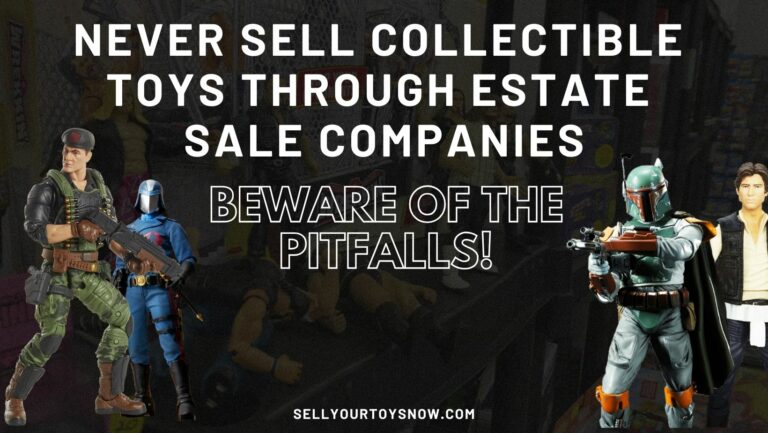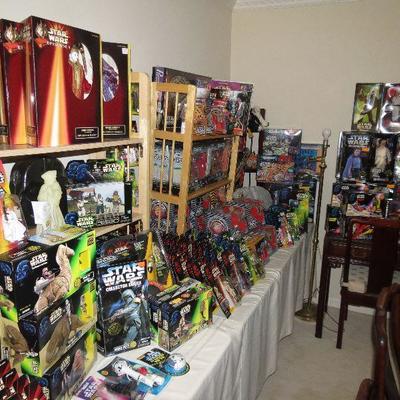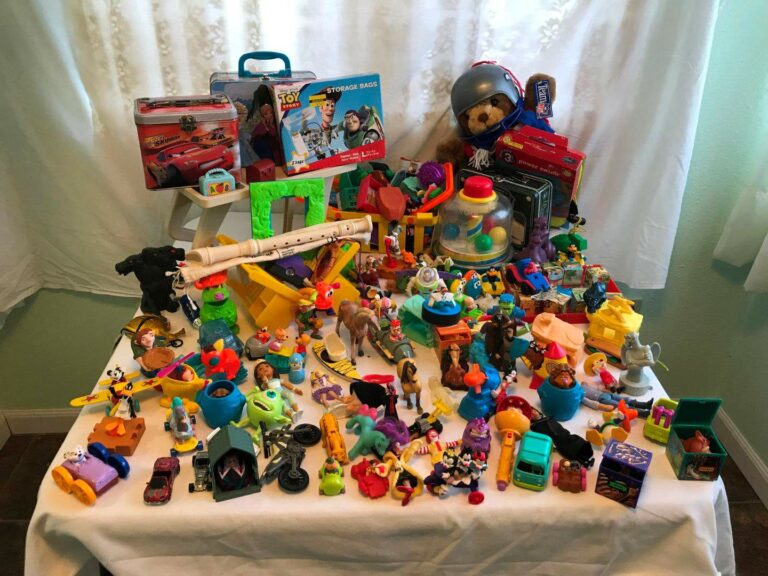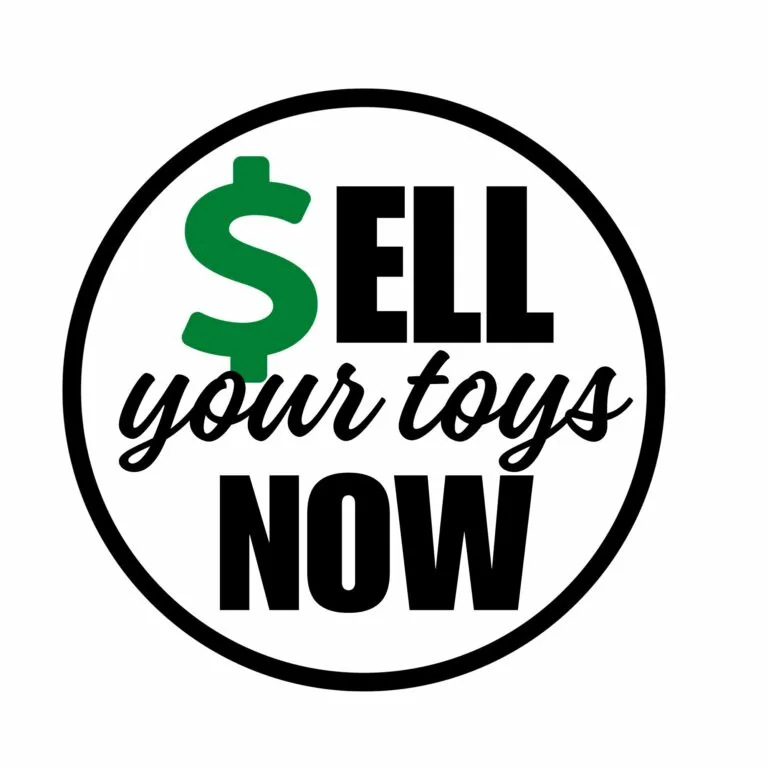Why You Should Never Sell Collectible Toys Through Estate Sale Companies

Hiring an estate sale company to liquidate your collectible toy collection may seem like an easy way to quickly sell off your toys, but there are some major drawbacks you need to consider first.
It’s likely your collectibles will sell for far less than they are worth if you hire an estate sale company.
You will get more for collectible toys like new in the box Barbies, action figures like Star Wars & Marvel and other collectible toys if you sell them to a toy company like Sell Your Toys Now before hiring the Estate Sale Companies.
Get a Better Rate Than Estate Sale Companies and Sell Your Toys With Us!
Step 1: CONNECT: Let us know what toys or collections you have.
We have many options. You can email, use our app, submit photos, submit a list, or use our toy pricer. This will give us a better idea of what you’re selling.
Step 2: GET A QUOTE: Receive a quote from Sell Your Toys Now.
Within two business days, our staff will evaluate your collection and respond to you with an offer to buy your toy collection. We give the fastest quotes in the industry.
Step 3: SEND & GET PAID: Ship your collection to receive payment.
If you are satisfied with our quote, you can accept the offer. We will then send you detailed instructions on how to package and ship your items.
We pay for the shipping and provide shipping labels. Once your items are checked in at our warehouse, you should receive payment within 48 hours. We pay via check, Venmo, or PayPal.
Why You Should Never Let an Estate Sale Company Sell Collectable Toys
Estate sale companies make their money by selling off as much as possible, as quickly as possible. They want to move high volumes of items out the door. Because of this, they often price things to sell quickly, with less regard for getting top dollar.
When it comes to collectibles, estate sale companies usually don’t have the specialized knowledge to accurately price more valuable, rare, or highly sought-after items. They may lump your rare collectibles in with more common items. This means your valuable collectibles could potentially sell for a fraction of what they are worth.
You or your loved one have likely spent years curating your collection, selectively adding rare and desirable pieces. You know the true value of your items. An estate sale company simply sees a room full of toys to be priced and sold quickly.
1. Estate Sales Take Large Percentage Commissions
Not only do estate sales under-promote your niche collectibles, they take a hefty cut of any sales through huge commissions. It’s common for estate sale companies to take commission rates of 35% to 50% or even more of the final sale prices.
Some may also tack on extra upfront organizing fees before the sale event itself. With the limited advertising and quick turnaround, final sale prices are usually well below open market value. Now take 35% or 50% off that, and your returns diminish even further.
For example, let’s say you have a rare toy worth $1,000 on the open collector market. At an estate sale, where customers want deals and focus on volume, it sells for $500. Take a 50% commission, and you just netted $250 instead of the full $1,000 value.
Losing $750 on one collectible item adds up fast when dealing with an entire toy collection built up over many years. You lose most of the value you could have gotten connecting directly with specialty collectors yourself and negotiating fair prices.
Between limited buyer reach and huge commissions off already discounted prices, estate sale companies can decimate your collectible toy returns. Carefully promoting items yourself and selling at market value puts so much more money back into your pocket.
2. Unsold Toys Get Dumped at Rock Bottom Prices
At the end of an estate sale, it’s common practice for the company to heavily discount any unsold items. This fire sale price is basically them trying to get anything they can before tossing unsold products.
They may bundle together a big box of your unsold toys and sell the entire box for a single low price. Or they may re-price toys at something like $1 or $5 just to clear out inventory.
This liquidation frenzy bargains away all negotiating power and loses even more potential value. Rare, niche, or high-end toys get treated the same as common pieces. Now a passionate collector has no chance to still pay fair market value.
Unless you’re comfortable with prized possessions being effectively given away for pocket change, avoid sending your collectibles to estate sales. The risk is too high they ultimately end up in the unsold liquidation pile and go for a tiny fraction of their true worth.
3. Buyers at Estate Sales Are Looking for Deals
The shoppers who frequent estate sales are hoping to find great deals. They love scoped out estate sales for bargains on valuables that are underpriced.
Again, because the estate sale company is focused on volume over maximizing value, your collectibles may end up being those underpriced bargains shoppers are hoping for. The excited buyer will walk away with a great deal while your rare collectible goes for pennies on the dollar.

4. Estate Sale Companies Have Limited Geographic Reach
When an estate sale company runs a sale, they typically only market and advertise to people living close by. Their advertising is limited to some local postings, email lists, and signs put up a few days before the sale itself.
This very local and last minute approach means they will draw interest from a small pool of potential buyers. These will be people who just happen to live or be in the immediate area.
For rare or highly desirable collectible toys, limiting buyers to just those nearby means you lose out on demand from serious collectors farther afield. Your items could be undervalued simply because the most avid collectors were never even aware the sale was happening.
Broadly marketing a prized toy collection takes time and reaches. It should target online collectors groups, specialized forums, social media groups, and print publications with collector followings.
But an estate sale’s focus is liquidating the entire house quickly. They rely on whoever wanders in off the street that weekend. This leaves little chance of connecting with passionate collectors outside the neighborhood or region.
If the estate sale was the only chance for buyers to acquire your collectible, you’ve lost out on maximizing the return. The key is getting the word out to as many relevant potential buyers as possible across a wide geographic area.
Estate sales simply don’t have the time or resources to properly promote niche collectibles.
5. Limited Time to Properly Organize, Research, and Price Items
To liquidate the home’s contents quickly, an estate sale company needs to price everything fast. They don’t have time to thoroughly research each item to determine fair market value.
For collectibles, this can be especially problematic.
Your rare toys need to be properly identified, conditions assessed, and fair asking prices researched. This takes a lot of time and specialized knowledge.
Estate sales usually last just a few days over one weekend. The short time frame and focus on volume means your collectibles simply won’t get the detailed handling they deserve. Items can get overlooked or underpriced.
6. You Lose Control Over Who Buys Your Items
Selling your cherished collectible toys at an estate sale means you won’t have control over who ultimately buys the items. Without being able to vet buyers, your rare toys could end up in the hands of people who don’t truly appreciate their value.
A collector who has long searched for a high-end piece you’re selling may not even hear about the estate sale in time. Meanwhile, someone simply looking for a bargain could scoop it up. This can be disappointing if you hoped your prized collectibles would end up with other serious collectors.
7. Estate Sale Companies Prefer Selling Household Goods
The core business for estate sale companies centers around liquidating the contents of an entire home. This mainly involves general household items like furniture, decor, kitchenware, clothes, tools, and everyday knickknacks.
These broad household categories make up the bulk of inventory at any estate sale. When it comes to niche collectibles like toys, most estate sale companies would much prefer to not have to fool with them.
Toy collections require specialized knowledge and marketing to maximize value that goes above and beyond selling off couches and coffee makers. Most estate companies won’t have expertise in the latest toy collectible trends, key manufacturers, rare finds, and point values for condition.
Given the choice, they’d rather focus time and energy on easier to price and sell household categories. Your toy collection ends up being an unwanted hassle. They will apply broad general pricing tiers just to check it off the to-do list.
For important collections you’ve invested years into building, you want specialists who understand the niche, not generalists forced to make guesses. Go with collectible experts, not broad estate sale firms.
8. You Can Sell to Collectible Toy Dealers for More
Rather than rolling the dice at estate sales, you can take proactive steps to get top dollar for your collectible toys. One smart move is partnering directly with reputable collectible buyers.
These businesses specialize specifically in collectible toys, comics, cards, and other niches. They have expert knowledge and existing customer bases of fellow collectors.
Consignment with collectible dealers makes more sense than estate sales because:
They accurately price each item based on market rates for condition
They market and advertise to collectors specifically interested in your niche items
You can access a nationwide collector base, not just local buyers
They’ll network at conventions and industry events to find ideal buyers
They take reasonable commissions of 10-25%, not 35%+ like estate sales
Items aren’t discarded if unsold; they work to match with buyers until sold
For specialty collections, go right to the specialists. Avoid the estate sale middlemen. Consigning with niche collectible dealers maximizes returns by targeting the ideal audience.
Better Options for Selling off a Toy Collection
If you have a valuable toy collection, there are much better options than hiring an estate sale company. You can maximize the value and ensure your beloved collectibles end up in good hands.
Sell to Fellow Collectors Like SellYourToysNow.com
One option is to network with other serious toy collectors to see who may be interested in purchasing your collection privately. You can selectively sell to collectors you feel will truly cherish the pieces. You can also take your time discussing fair asking prices for more valuable items.
Consignment Shops
For rare, highly valued toys, consider consignment shops that specialize in collectibles. They have the expertise to accurately assess and price rare finds. Though they take a cut, you typically make more than liquidating through an estate sale. You also have a say where items end up.
Online Collectible Marketplaces
Online collectible marketplaces allow you to market directly to fellow collectors. You can describe items, show detailed photos, and field offers from serious buyers. You can sell locally or nationwide. Fees are reasonable and there’s good price transparency.
Take the Time to Do it Right
An estate sale may seem like the fast and easy route. But for collectibles, it rarely yields the best results. If your collection is meaningful to you, take the extra time and care. Reach out to fellow collectors, do your pricing research, and thoughtfully sell your collection off piece-by-piece. This will maximize your returns and give you peace of mind about where your collectibles end up.
Avoid Damaged Items and Missing Pieces
When selling off your collectible toys, you’ll want to avoid items that are noticeably damaged or missing critical parts and accessories. Here’s why:
Dramatically Reduces Value
Condition is critical when it comes to collectibles. An item with significant wear, broken parts, or other damage can be worth a fraction of one in pristine shape. Missing pieces also greatly reduce value for toys and sets.
For example, an old Star Wars figurine in perfect condition might be worth $100+. But that same figurine with a broken limb or scratched paint may only fetch $20.
Harder to Verify Authenticity
Damage also makes it harder for buyers to verify if an item is truly authentic vs a replica or knock-off. This added uncertainty will further hurt value.
For example, a rare Barbie doll missing its neck stamp or other identifying marks will be tougher to confirm as genuinely vintage. A buyer will offer less without this assurance.
Frustrates Collectors
Serious collectors want items in the best condition possible. They cherish mint items and will pay premium prices for them. Damaged goods or incomplete sets will simply not meet their standards.
They want to display and enjoy your collectible, not repair it. You’ll severely limit your pool of buyers if items aren’t intact and undamaged.
Restoration is Costly
Professional restoration services are expensive. The cost of restoration typically exceeds any added value the repairs will bring.
For example, paying $100 to fix a rare toy only worth $150 after restoration makes little economic sense. Leave repairs to buyers. Focus on selling intact, undamaged items valued as-is.
Be Upfront in Descriptions
If you do need to sell damaged or incomplete items, be transparent in your descriptions. Detail all flaws, missing or broken parts, and any original packaging that is missing.
Price the items accordingly. This allows buyers to make informed decisions based on an item’s true condition. Trying to hide or downplay damage will only frustrate buyers.
Aim for quality over quantity as you liquidate your toy collection. Undamaged, complete items will sell easier and for premium prices. Avoid the hassle of restoration. Your stellar offerings will be cherished by devoted collectors.

Set Realistic Expectations on Returns
When selling off your collectible toys, it’s important to set realistic expectations on potential returns. Collectible values fluctuate over time and not every toy you own will be worth a fortune. Manage your expectations by:
Researching Fair Market Value
Do some homework on the current fair market value for items you are looking to sell. Check recent completed sales and listings for similar condition items sold on auction sites and collectible marketplaces. Recent comps give you the best sense of real-world value.
Considering Condition
Remember, condition greatly impacts value. A rare toy that shows heavy play wear or damage will sell for much less than one in pristine shape, even if mint versions sell for thousands. Be honest about your items’ condition.
Ignoring Outlier High Prices
Some listings may have super inflated prices well above fair market value. Ignore these outliers. Go by what mint condition items have actually sold for recently from reputable sellers.
Checking Demand Trends
Some collectibles see renewed demand and escalating prices due to media exposure, anniversaries, or other factors. But many toys see waning interest over time, hurting values. Study up on current demand trends surrounding your pieces.
Getting Professional Appraisals
For ultra high-end rarities, get professional appraisals. Appraisers are most familiar with the upper-end market. But still be prepared for items to potentially sell below appraisal, which gives theoretical maximum value.
Avoiding Emotional Attachment
It’s hard to remain objective about toys you have a strong nostalgic attachment to. Separate emotions from realistic valuations. Not every childhood toy is going to sell for a fortune.
Setting realistic expectations upfront makes selling your collection smoother.
Do your homework, stick to current fair market values, and highlight condition honestly. This keeps you grounded on returns.
Be Wary of Auction House and Estate Sale Commissions
When selling your collectible toys through an auction house or estate sale company, be prepared for hefty commissions that quickly eat into your returns.
Some common commissions to keep in mind:
Auction Houses – Commonly charge 15% – 25% of the final hammer price. The nicer the auction house, the higher the fees. Rare, high-ticket items may justify the fees.
Online Auctions – eBay, for example, charges 12.55% of the final value amount plus a listing fee. Other sites have similar fees in the 10% – 15% range.
Estate Sales – Typically charge around 35% – 50% of your items’ final sale prices. Some may also charge extra upfront fees for organizing and marketing the sale.
Consignment Shops – Often charge 40% or more of the final tagged sale price. Fees tend to be highest on high-value items.
While these options can maximize exposure, the fees quickly add up. For more valuable items, consider:
Selling directly to collectors and negotiating prices
Utilizing collectible marketplaces where fees are around 5% – 10%
Selling locally for cash then you keep the full sales price
Do some break-even analysis before consigning items or sending to auction. After fees, would you clear more by selling yourself? Understand the commissions upfront so returns don’t fall short of expectations.
Conclusion
Liquidating a beloved collectible toy collection is a big endeavor that requires thought and care. While an estate sale company may seem like the fastest option, you sacrifice money and control over where your prized toys end up.
Instead, take the time to handle your collection the right way. Research fair values. Network with fellow collectors. Utilize reputable consignment shops and online marketplaces. Avoid damaged goods. Photograph and package items meticulously.
Treat your collection with the same passion you did when building it. This will maximize your financial return and give you peace of mind knowing your collectibles end up in good hands. Future generations of collectors will be thrilled to carry on the treasured toys that brought you so much joy.
Frequently Asked Questions
How can I determine fair value for my collectible toys?
The best way is to research current selling prices. Look for completed listings on auction
sites and collectible marketplaces for items in similar condition to yours. Recent sold prices give you an accurate picture of real-world value.
Should I get my toys professionally appraised first?
For very high-end or elite museum-worthy pieces, professional appraisals may be wise to understand maximum theoretical value. But appraisals cost money themselves. And real-world selling prices often come in below appraisals.
How do I find interested buyers for my collection?
Check forums and groups related to your specific toys. Attend collectible conventions. Network with other enthusiasts to generate word-of-mouth interest. You can also consign to reputable shops or list on major online marketplaces.
What should I do if my toys have some damage or imperfections?
Minor flaws are expected with most used collectibles. Be honest and transparent when describing any damage or missing parts. Take clear photos documenting it. Price accordingly rather than trying to hide it. Some buyers don’t mind minor imperfections if the price reflects condition.
Is an estate sale company still a viable option?
For very common, low-value toys it can be fine. But for anything rare, valuable, or highly collectible, you will likely take a big financial hit using an estate sale. The specialist knowledge needed to properly price and market prized collectibles typically makes them a poor choice for estate sales.
Get a Better Rate Than Estate Sale Companies and Sell Your Toys With Us!
Step 1: CONNECT: Let us know what toys or collections you have.
We have many options. You can email, use our app, submit photos, submit a list, or use our toy pricer. This will give us a better idea of what you’re selling.
Step 2: GET A QUOTE: Receive a quote from Sell Your Toys Now.
Within two business days, our staff will evaluate your collection and respond to you with an offer to buy your toy collection.
Step 3: SEND & GET PAID: Ship your collection to receive payment.
If you are satisfied with our quote, you can accept the offer. We will then send you detailed instructions on how to package and ship your items.
We pay for the shipping and provide shipping labels. Once your items are checked in at our warehouse, you should receive payment within 48 hours. We pay via check, Venmo, or PayPal.
